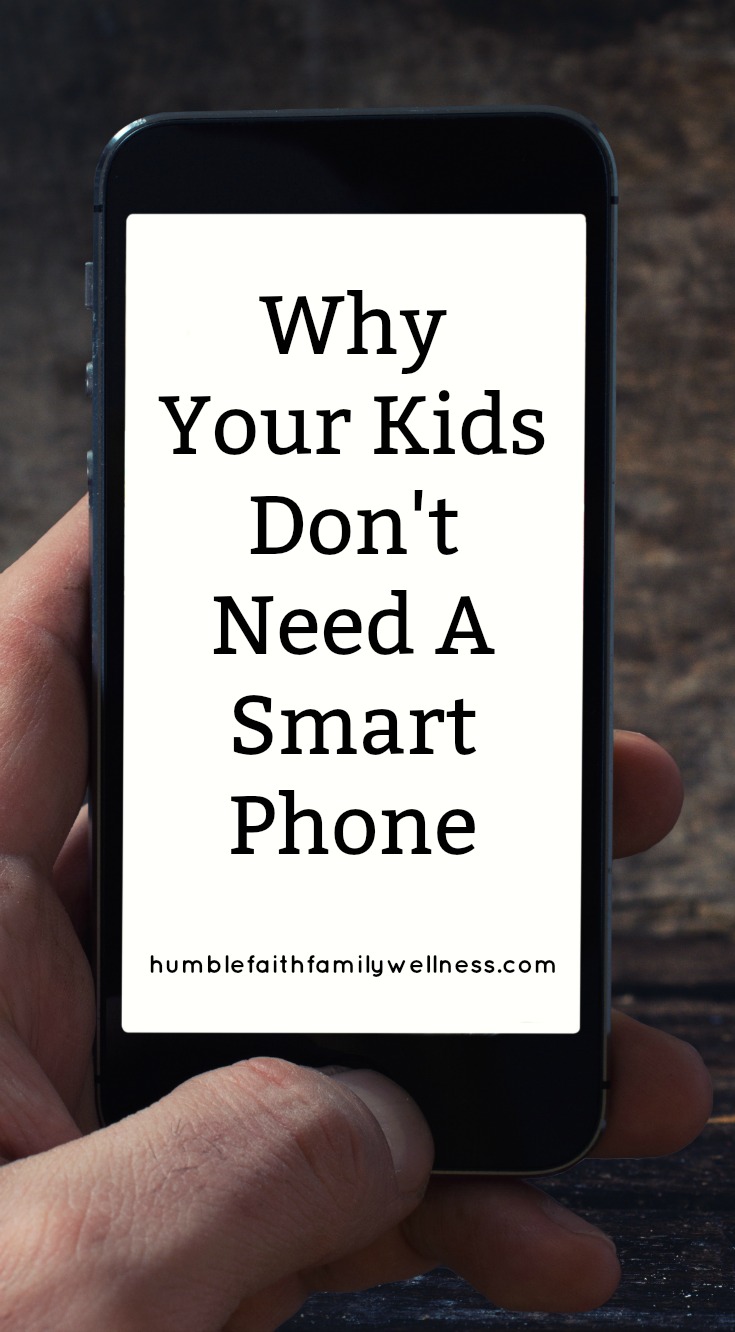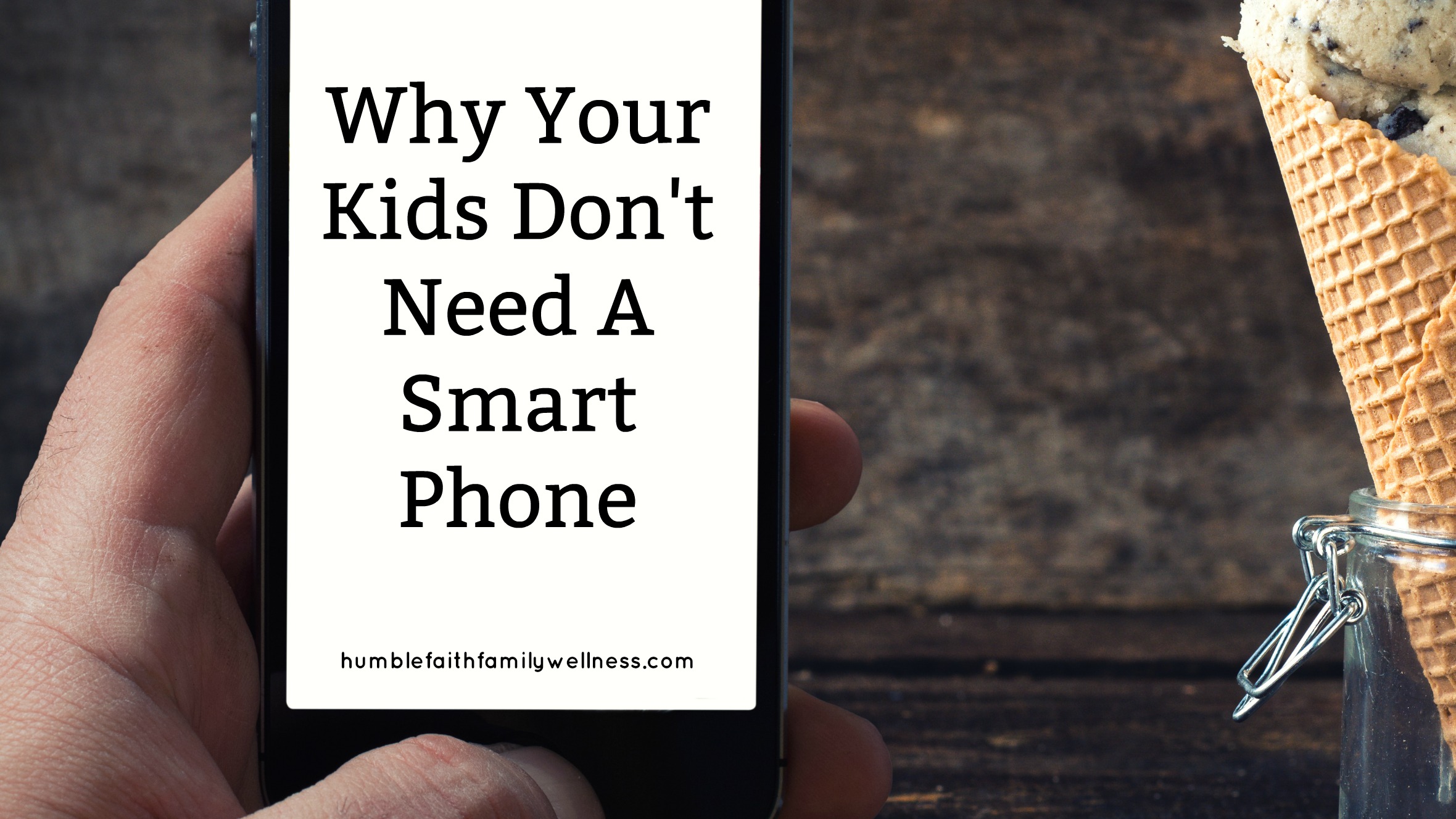
*This post may contain affiliates. Read the full disclosure here.
As a mental health therapist I work with kids of all ages, adults, and families. I hear a wide variety of topics, issues, and painful stories.
One topic that gets brought up time and time again is arguments about the smartphone.
And truthfully it boggles my mind. In comparison to all of the other issues we have in this world. The things we have no control over. The pain some people have suffered at the hands of others.
This topic really is pretty easy. (And I fully recognize I’m stepping on lots of toes.) But they just don’t need a smartphone.
Why Your Kids Don’t Need a Smartphone:
Added Distraction
Let’s be honest. Really honest. How often do you actually need your smartphone?
The majority of the time a person is on their smartphone is for distraction purposes. Social media – distraction. Playing games – distraction. Checking notifications – distraction. Watching YouTube – distraction to the extreme.
Our children have enough distractions in their life we don’t need to purposefully hand them another one. It becomes a hindrance to homework, paying attention in class, completing chores, family meals, driving abilities, bedtime, etc.
And the use of smartphones and other electronic devices are also a hindrance to your brain’s creativity and thought processes. The brain’s ability to take in information from these devices is passive. It doesn’t cause significant critical thinking. At the same time, the barrage of images on electronic devices overstimulates the brain. That means it’s not working in ways that are actually beneficial.
Power Struggle
The #1 power struggle between parents and children, that my clients discuss with me, is over the smartphone.
They can’t get their child off at designated times (or ever). Or they won’t turn it in at night. It got broke for the umpteenth time. There are arguments about who pays for it. The list of power struggles goes on and on.
And then the smartphone gets used as the only discipline tool no matter the situation. Which doesn’t really help connect the negative behavior to the consequence so the behavior just continues. But the child becomes so attached to the smartphone that other items just don’t hold much clout.
If your child can’t abide by the rules surrounding the smartphone, they’re not ready for one!
Struggle with Connection
Our children are also becoming less able to communicate with others in person. Which makes sense. Electronics offers the ability to be able to edit. To sit and think of the perfect response. In-person interactions don’t offer that option.
I’m seeing an increase in social phobia with my adolescent and teen clients. They describe excessive worry and panic about the idea of having to talk and interact with people they don’t know.
The result leads to isolation. And children and teens are dramatically reporting increased feelings of loneliness.
As a society, the next generation is also less able to read real-life facial expressions and then know how to interact (that’s called social and emotional intelligence). That means decreased self-awareness, self-regulation, social skills, empathy and motivation.
Cyberbullying
Another significant issue with smartphones and children are the cyber-bullying they are experiencing. Bullying has always existed but with increased technology our children aren’t able to get away from it. It follows them where ever they go. And the statistics are a sad:
- 42% of teenagers with tech access report being cyberbullied over the past year.
- 81% of teens say bullying online is easier to get away with.
- 20% of kids cyberbullied think about suicide, and 1 in 10 attempt it.
I’ve had multiple clients in my office in tears over the nasty things that peers have posted on social media. I’ve had clients struggle with self-harming behavior because of the comments. And I’ve had to hospitalize kids due to suicidal thoughts – because of the torment they were experiencing through social media on their smartphone.
Pornography
Pornography is also a very real problem for our kids. And having a smartphone only makes access easier. I currently have four clients under the age of 12 that are addicted to pornography. Each one started with a pop-up on YouTube while using their smartphone.
Combating the Arguments:
“But a smartphone is just one way to access the internet.” – True, but other devices have greater parental control abilities.
“All of my kid’s friends have one. I don’t want them to get picked on.” – This really is a very good opportunity to teach your child their worth. They are more than their gadgets. Their social media likes and shares. Their clothes, looks, friends, etc. Your child is a child of God. That is always enough and helping your child to stand on their morals and values is an invaluable lesson.
“I want to be able to contact my child.” – First, let’s talk about how often you are interacting with your child throughout the day. Why?
You do not need to be adding to their distractions. If the are in school. They should be focusing on school. If they are with friends. Let them be with their friends. You do not need to send your child a picture on Snap Chat, a message on Facebook, or a Tweet on Twitter.
And if you legitimately need to contact your child due to scheduling changes then, yes, call or text them. But there are other cellphone options beyond a smartphone.
Options:
This seriously is my exact phone. It calls and texts. Your child doesn’t need anything else beyond these functions. You then buy phonecard minutes. If they run out. They run out. It really can be as easy as this.
*Now I fully expect that there are some parents who are reading this and can say that their teen is awesome at handling their smartphone. And it doesn’t cause issues in the home at all, their teen has never experienced cyber-bullying or they are self-assured enough to handle it and they would never mess around with pornography. But I can assure you, your teen is then the exception to the rule. Not the norm.
God bless!
Melissa

We often hear about how “everyone” other than our children have their own phones. But for one, it’s not true, lots of kids don’t have their own phones. And for two, I don’t really care. Our rule has always been that they can have a phone when they can buy a phone and pay for it themselves. Having a phone is a responsibility, not a given.
And it’s a huge responsibility that requires maturity and self-control! Thank you for stopping by and sharing your experience. God bless!
Power struggles are right on! My kids like to fight over my phone.
My hubby and I have had talks about this!
Thankfully I don’t have a smartphone and my husband doesn’t give up his for the kids! 🙂
Thank you for sharing this. It was good information and convicting at the same time. My husband and I have been against our kids having smart phones (our oldest is 12). Then we sort of caved and allowed our 12-year-old to get an iPod for Christmas with her Christmas money from grandparents. We thought it was a nice compromise (it doesn’t text or call) but it has the other functions of a smart phone so it’s almost worse (I should’ve known). It’s been such a struggle keeping on top of how much time is spent on it, monitoring apps, etc etc. Our rule is no electronics during the week, only weekends, but even then I feel like it causes anxiety for her. She’s much happier when she doesn’t have access to it during the week. Time to re-evaluate this!
It is amazing how much happier, more content, and at peace all of us feel when we unplug from electronics. And this is especially true for kids and teens. There is so much junk to have to sift through. False messages. Comparisons. I’m glad that you found the post beneficial and timely for you. Thank you for stopping by and sharing your experiences. God bless!